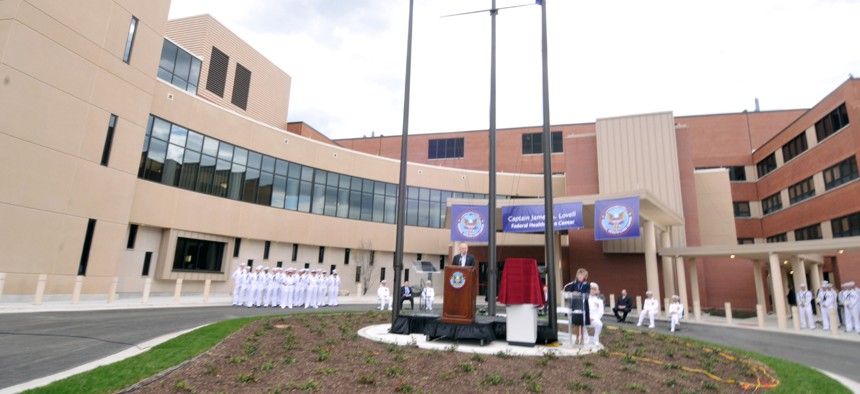VA officials tout EHR rollout at Chicago site amid efforts to address oversight concerns

Retired Capt. James A. Lovell, left, a NASA astronaut, speaks to more than 750 guests at the official opening of the Capt. James A. Lovell Federal Health Care Center in Chicago. Scott Thornbloom/U.S. Navy
Although implementation of VA’s EHR system at additional sites remains paused, a critical rollout of the software at the Captain James A. Lovell Federal Health Care Center earlier this month was “the most successful deployment we’ve had,” VA Undersecretary for Health Shereef Elnahal said.
A key rollout of the Department of Veterans Affairs’ beleaguered electronic health record system is exceeding early expectations, according to VA officials, even as recent watchdog reports identified patient safety concerns and scheduling issues at other medical facilities using the new software.
Earlier this month, VA and the Department of Defense announced the rollout of the EHR system at the Captain James A. Lovell Federal Health Care Center in North Chicago, Illinois. The implementation of the new software, designed to be interoperable with DOD’s Oracle Cerner EHR system, marked the last deployment of the Pentagon’s new software at department clinics, facilities and hospitals around the world and the only joint rollout of the system for the two departments.
When asked about the status of the EHR system’s implementation at Lovell during the department’s monthly press conference on Tuesday, Dr. Shereef Elnahal — VA’s undersecretary for health — said “we're seeing this as the most successful deployment we've had.”
“We'll be very transparent when problems arise and we'll jump on any issue to fix it,” Elnahal added. “But so far, I think, in part because of the incredible teamwork between VA and DOD, but also the learnings — we've had significant learnings over the last several years — we think the deployment’s going quite well so far.”
With the exception of Lovell, VA has paused new deployments of the software. The department announced the freeze last April as part of a “program reset” to address issues at the five other VA medical facilities currently using the new system.
VA officials previously pointed to the EHR system’s deployment at Lovell as a key component of the reset, given the facility’s larger size in comparison to the other sites where the Oracle Cerner software has been implemented.
VA Secretary Denis McDonough echoed Elnahal’s positive view of the EHR system’s rollout at Lovell thus far, saying during Tuesday’s press conference that “as of the middle of last week, that facility was at about 60% of pre-go-live appointment manifestation, meaning they're fulfilling 60% of the appointments.”
“That was a little bit ahead of what they had assessed would be the likely outcome,” he added. “Remember that in each of the go-lives, there's expected to be a substantial productivity loss as we work through the training and the deployment of the new system. So that's an important number.”
VA taking steps to address issues raised in watchdog reports
McDonough and Elnahal said the department will continue to monitor the recent deployment to ensure that no serious issues arise at Lovell in the coming months. They added that rigorous oversight by VA’s Office of Inspector General is helping them address technical and patient safety issues that have arisen from the EHR system’s rollout so far.
The press conference came less than a week after the VA OIG released three separate reports detailing issues with the EHR system at the five medical facilities where the Oracle Cerner software had been deployed prior to the rollout at Lovell.
“It's really, really, really important that the IG dedicates the kind of attention and time and resources to EHR that he has dedicated so far,” McDonough said.
One report examined how a “system error” in the EHR system’s scheduling software at the VA Central Ohio Healthcare System in Columbus, Ohio, failed to appropriately route a patient’s missed appointment for mental health services to a queue for rescheduling efforts, which the watchdog cited as a factor in the veteran’s accidental overdose in 2022.
An additional management advisory memo from VA OIG warned that scheduling issues associated with the EHR system deployed at smaller facilities could be exacerbated at larger sites, particularly given broader clinical staffing shortages.
The watchdog’s third report examined how “an error in software coding” within the EHR system’s pharmacy software left some 250,000 who received treatment at both VA facilities using the new Oracle Cerner software and other medical sites using the department’s legacy system at risk of receiving the wrong medications.
In terms of the OIG report detailing the patient safety incident at the Columbus facility, Elnahal said VA officials have conducted an investigation into the underlying issues and “are making and have made already significant changes to our processes as we interface with the new electronic health record to prevent this from ever happening again.”
McDonough also said VA has been so deeply engaged with the OIG regarding the three studies in recent weeks “that we were in a position to begin to address some of the really fundamental concerns in the pharmacy report.”
This includes communicating with veterans who may have been affected by interoperability issues between sites using the new EHR system and the vast majority of VA health centers still using the legacy health record system.
McDonough said the department was still not ready to restart future deployments of the new EHR system or plan a startup timeframe and would remain in its reset phase “until we are confident that we are making the system work in a way that improves veteran outcomes.”






